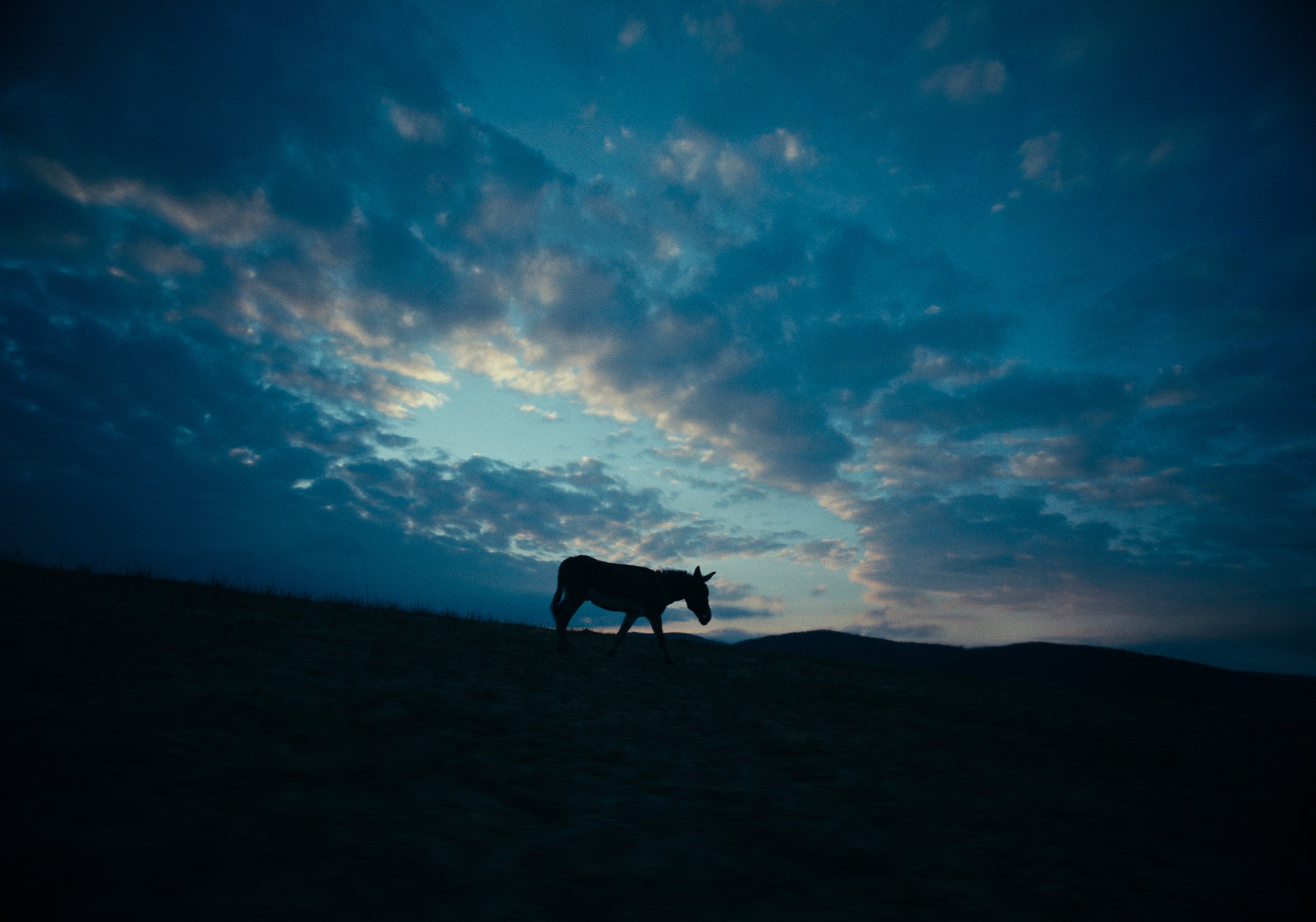EO: Tripping in Donkey-Vision with a Polish Master
By Liam Lacey
Rating: A-minus
The film, EO, from the now 85-year-old Polish director, Jerzy Skolimowski, is an homage to Robert Bresson’s revered 1966 film, Au hasard Balthazar (Balthazar by Chance), which contrasts the donkey’s innocent life with the human venality and cruelty that surrounds him.
Many critics have seen the donkey as a Christ-like figure.
EO (named for the sound of a donkey’s bray), which won a jury prize at Cannes and is Poland’s nominee for the Oscars, follows a similar story to Bresson’s film. But it’s secular and strikingly different in style.
Skolimowski’s film, composed and shot over two years, written by the venerable director (Moonlighting, The Shout, Walkower) and his spouse, Ewa Piaskowska, is an experimental affair with a fragmentary story line.
What draws us in is the inventive and luminous cinematography from Michal Dymek (with additional footage by Pawel Edelman and Michal Englert), using drone shots, fish-eye lenses and red and blue filters. Accompanied by an unsettling electronic score, the donkey-in-a-disco effect is trippy, a hallucinogenic projection of what it might be like to live in an animal’s consciousness, including its dreams and flashbacks.
Donkeys, the sad clowns of the working animals, have a long literary and religious tradition as symbolic creatures. As I wrote about David Redmon and Ashley Sabin’s philosophical documentary, Do Donkeys Act?, they are easy to anthropomorphize as “their solemn pool-like eyes and antenna- ears, meet our gazes and compel us to reflect on what they see.”
That said, EO should not be confused with baby-eyed characters like Wall-E and ET. The film, which has an animal rights message within its melancholic tale, has received more than its share of reviews in the, “I cried and you should too,” line, which is reductive. Rather, EO should also be appreciated for the odd, erratic invention that it is, without trying to pin a tail on it.
EO (played by six male and female grey donkeys) is first seen working at a Polish circus with a beloved performer, Magda, whose stage-name is Kasandra (Sandra Drzymalska). All is well, until animal rights activists decide to “liberate” him. After a stint at a horse sanctuary, the homely relative of the skittish, beautiful creatures, EO moves on to a petting farm for children with disabilities. After Kasandra comes to visit the donkey on its birthday, EO breaks free to find her again and gets lost in the nearby woods.
What follows is the film’s most surreal and harrowing sequence. Lasers cut through the darkness, hunters’ guns roar, wolves howl and frightened foxes and wolves scurry through the woods. As EO walks into the dawn and toward the rising sun, the screen turns blood red and the camera spins to the movement of a windmill’s arms.
Human violence continues to follow him. EO is taken up as the mascot for a football team, and, then, viciously beaten by fans from a rival squad. As he lays on the ground, the donkey reimagines itself as a Boston Dynamic robot, scuttling through the night on spindly metal limbs.
There are more episodes on the donkey’s journey, including a scene at a fox farm and one where EO is sold for the illegal meat trade.
As spooky as these scenes are, they can’t match a dialogue-heavy sequence late in the film where EO is acquired by a troubled young Italian priest (Lorenzo Zurzolo). The priest who takes the animal to his family’s estate, overseen by his tempestuous step-mother, a Countess, played by Isabelle Huppert who almost hijacks the film with her display of methodical crockery smashing.
What the scene has to do with the rest of the film is a puzzle without a solution. Whether it’s umbrage at being so shamelessly upstaged, or disgust at witnessing another sordid human drama, EO abandons the estate’s green lawns through the front gate, and heads toward its fate with its ears held high.
EO. Directed by Jerry Skolimowski. Written by Jerry Skolimowski and Ewa Paiskowska. Starring Sandra Dryzmalska, Isabelle Huppert, Lorenzo Zurzulo and Mateusz Kosciukiewicz. EO opens in theatres across Canada on Nov. 25.



